
A concept album is an album whose tracks hold a larger purpose or meaning collectively than they do individually. This is typically achieved through a single central narrative or theme, which can be instrumental, compositional, or lyrical. Sometimes the term is applied to albums considered to be of "uniform excellence" rather than an LP with an explicit musical or lyrical motif. There is no consensus among music critics as to the specific criteria for what a "concept album" is.

Francis Albert Sinatra was an American singer and actor. Nicknamed the "Chairman of the Board" and later called "Ol' Blue Eyes", he is regarded as one of the most popular entertainers of the mid-20th century. Sinatra is among the world's best-selling music artists with an estimated 150 million record sales.
"Stormy Weather" is a 1933 torch song written by Harold Arlen and Ted Koehler. Ethel Waters first sang it at The Cotton Club night club in Harlem in 1933 and recorded it that year, and in the same year it was sung in London by Elisabeth Welch and recorded by Frances Langford. Also in 1933, for the first time the entire floor revue from Harlem's Cotton Club went on tour, playing theatres in principal cities. The revue was originally called The Cotton Club Parade of 1933 but for the road tour it was changed to Stormy Weather Revue; it contained the song "Stormy Weather", which was sung by Adelaide Hall.
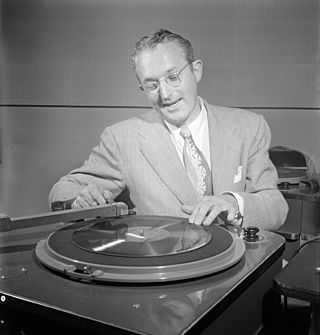
Thomas Francis Dorsey Jr. was an American jazz trombonist, composer, conductor and bandleader of the big band era. He was known as the "Sentimental Gentleman of Swing" because of his smooth-toned trombone playing. His theme song was "I'm Getting Sentimental Over You". His technical skill on the trombone gave him renown among other musicians. He was the younger brother of bandleader Jimmy Dorsey. After Dorsey broke with his brother in the mid-1930s, he led an extremely successful band from the late 1930s into the 1950s. He is best remembered for standards such as "Opus One", "Song of India", "Marie", "On Treasure Island", and his biggest hit single, "I'll Never Smile Again".

"Stardust" is a pop song written by Hoagy Carmichael and Mitchell Parish. Now considered a standard and part of the Great American Songbook, the song has been recorded over 1,500 times either as an instrumental or vocal track, featuring different performers. During his time attending Indiana University, Carmichael developed a taste for jazz. He formed his own band and played at local events in Indiana and Ohio. Following his graduation, Carmichael moved to Florida to work for a law firm. He left the law sector and returned to Indiana, after learning of the success of one of his compositions. In 1927, after leaving a local university hangout, Carmichael started to whistle a tune that he later developed further. When composing the song, he was inspired by the end of one of his love affairs, and on the suggestion of a university classmate, he decided on its title. The same year, Carmichael recorded an instrumental version of the song for Gennett Records.
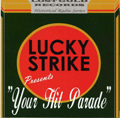
Your Hit Parade was an American radio and television music program that was broadcast from 1935 to 1953 on radio, and seen from 1950 to 1959 on television. It was sponsored by American Tobacco's Lucky Strike cigarettes. During its 24-year run, the show had 19 orchestra leaders and 52 singers or groups. Many fans inaccurately referred to the show as The Hit Parade.

Phil Silvers was an American entertainer and comedic actor, known as "The King of Chutzpah". His career as a professional entertainer spanned nearly 60 years. He achieved major popularity when he starred in The Phil Silvers Show, a 1950s sitcom set on a U.S. Army post in which he played Master Sergeant Ernest (Ernie) Bilko. He also starred in the films It's a Mad, Mad, Mad, Mad World (1963) and A Funny Thing Happened on the Way to the Forum (1966). He was a winner of two Primetime Emmy Awards for his work on The Phil Silvers Show and two Tony Awards for his performances in Top Banana and A Funny Thing Happened on the Way to the Forum. He also wrote the original lyrics to the jazz standard "Nancy ".
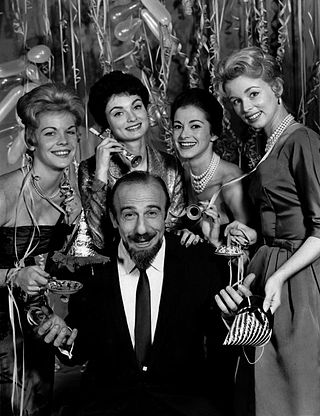
Mitchell William Miller was an American choral conductor, record producer, record-industry executive, and professional oboist. He was involved in almost all aspects of the industry, particularly as a conductor and artists and repertoire (A&R) man. Miller was one of the most influential people in American popular music during the 1950s and early 1960s, both as the head of A&R at Columbia Records and as a best-selling recording artist with an NBC television series, Sing Along with Mitch. A graduate of the Eastman School of Music of the University of Rochester in the early 1930s, Miller began his musical career as a player of the oboe and English horn, making numerous highly regarded classical and popular recordings.
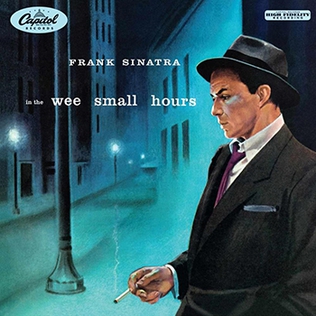
In the Wee Small Hours is the ninth studio album by American vocalist Frank Sinatra. It was released in April 1955 by Capitol and produced by Voyle Gilmore with arrangements by Nelson Riddle. The album's songs deal with themes such as introspection, melancholy, lost love, failed relationships, depression and night life. The cover artwork reflects these themes, portraying Sinatra alone at night on an eerie and deserted city street awash in blue-tinged street lights.

Gordon Lee "Tex" Beneke was an American saxophonist, singer, and bandleader. His career is a history of associations with bandleader Glenn Miller and former musicians and singers who worked with Miller. His band is also associated with the careers of Eydie Gormé, Henry Mancini and Ronnie Deauville. Beneke also solos on the recording the Glenn Miller Orchestra made of their popular song "In The Mood" and sings on another popular Glenn Miller recording, "Chattanooga Choo Choo". Jazz critic Will Friedwald considers Beneke to be one of the major blues singers who sang with the big bands of the early 1940s.
"My One and Only Love" is a 1953 popular song with music written by Guy Wood and lyrics by Robert Mellin. Notable renditions by Frank Sinatra (1953), and later by John Coltrane and Johnny Hartman (1963), have made the song part of the jazz standard musical repertoire.
William Barry Wood, Jr. was an American football player and medical educator. Wood played quarterback for Harvard during the 1929–1931 seasons and was one of the most prominent football players of his time. He was elected to the College Football Hall of Fame in 1980.
Will Friedwald is an American author and music critic. He has written for newspapers that include the Wall Street Journal, New York Times, Village Voice, Newsday, New York Observer, and New York Sun – and for magazines that include Entertainment Weekly, Oxford American, New York, Mojo, BBC Music Magazine, Stereo Review, Fi, and American Heritage.
"Our Town" is a 1955 episode of the American anthology series Producers' Showcase directed by Delbert Mann and starring Frank Sinatra, Paul Newman and Eva Marie Saint. Sinatra plays the stage manager and Paul Newman and Eva Marie Saint portray the teenagers who fall in love and get married. The episode is a musical adaptation of Thornton Wilder's 1938 play Our Town, with songs by Jimmy van Heusen and Sammy Cahn, mostly sung by Sinatra the stage manager between and during scenes from the play, and including a duet with Paul Newman and Eva Marie Saint. The 90-minute show was Sinatra's only performance in a dramatic role specifically for television until Contract on Cherry Street in 1977.
"It's Only Money" is a song from the 1951 RKO Radio Pictures musical Double Dynamite, written by Jule Styne and Sammy Cahn and performed by Frank Sinatra and Groucho Marx.

The Frank Sinatra Show was a title applied—in some cases specifically and in other cases generically—to several radio musical programs in the United States, some of which had other distinct titles as indicated below. Singer Frank Sinatra starred in the programs, some of which were broadcast on CBS, while others were on NBC.
"In the Blue of Evening" is a song by Al D'Artega and Tom Adair recorded and released in 1943 by Tommy Dorsey and his Orchestra, with Frank Sinatra as the main vocalist. It was subsequently re-recorded by Sinatra, but did not feature on a release until a 1993 reissue of the album I Remember Tommy.
"Oh! What it Seemed to Be" is a song composed by Bennie Benjamin, George Weiss and Frankie Carle. The song was most popular in 1946, and was taken to number 1 that year by both Frank Sinatra and the Frankie Carle orchestra, the latter with Marjorie Hughes on vocals.
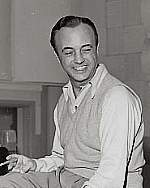
Raymond Dominic Sinatra was an Italian-born American conductor, best known as the music director of Mario Lanza.

Joan Edwards was an American film actress and singer-songwriter in the old-time radio era. She was perhaps best known for her work on the radio version of Your Hit Parade. She also was a vocalist for Paul Whiteman and his Orchestra.












